How vulnerable to sanctions — official and market-driven — is Russia?
The Short-Run Economic Fallout of Russian Intervention
In the wake of unilateral moves by the Russian Federation, the US has imposed sanctions on Russia. [1] [2] [3] These measures have added pressure on Russian markets above and beyond those imposed by the international financial markets: the stock market is down, the currency has weakened, and sovereign bond yields are up. (Russian officials concede impact [4]
Figure 1: MICEX index, April 2013-April 2014. Source: Bloomberg.
Figure 2: USDRUB, April 2013-April 2014. Up is a depreciation of the Russian rouble. Source: Bloomberg.
Figure 3: Ten year Russian sovereign yield, 2007-2014. Source: TradingEconomics.
Elevated risk showed up in capital outflows, even as of the end of 2013.
Figure 1 from Y. Lissovolik, A. Zaigrin, “Russia: macro implications of increased geopolitical risk,” Emerging Markets Monthly (Deutsche Bank, 13 March 2014) [not online].
The Impact of Sanctions
The question, then, is whether economic sanctions will have the desired effect. Much of the conventional wisdom regarding sanction efficacy can be found in the work of Hufbauer, Schott, Elliott, and Oegg, who draw their conclusions from an analysis of a large set of sanction episodes. Successful sanctions (about a third of cases) imposed costs in excess of 2 percent of GDP, while unsuccessful sanctions imposed costs of about a percent of GDP. Much depends on what is the “desired effect”; I’ll return to this point at the end.
In most — or at least many — previous episodes, the sanctions worked more through the trade channel. Most of the impact seen thus far in the Russian episode has been along the financial dimension; it remains to be seen whether the financial impact will be greater, or perhaps more focused, on relevant target groups. From a memo by Steve Englander/Citi yesterday (“International finance as continuation of war by other means”):
The Russia/Ukraine crisis may be the first major political conflict that is played out in international financial markets. The difference between this and standard imposition of sanctions is that both sides have some options that can inflict damage on the other side. Normally sanctions involve a big group of countries on one side and a vulnerable target on the other so the vulnerability is very asymmetric. Small countries can occasionally expropriate big country assets but in most cases that ostracizes the small country from the international financial community.
Obviously, the impact of the financial sanctions depends on the credibility of the threat of imposition. For Europe, where natural gas supplies and bank loan exposure loom large, the threat is less credible. From G. Moec, M. Stringa “Who is exposed to Russia?” Deutsche Bank, 20 March 2014:
In absolute terms, French banks are – by far – the most exposed, with USD 51bn claims (loans and securities) over Russia in Q3 2013.
However, these claims must be compared with total bank assets in each country to get a sense of the systemic impact that an asset freeze or deterioration in the creditworthiness of Russian assets could have. Austria then comes out with the highest ratio (1.4%), followed by the Netherlands and Italy.
Still, at 0.5% of total bank assets, we would regard the French ratio as significant, especially in a period of pressure on capital ratios.
The United States, however, has less direct bank exposure, and doesn’t depend heavily on Russian exports, energy or otherwise. In that respect, the threat of additional US sanctions are credible.
In addition, while Russia seems fairly resilient along some dimensions — high foreign exchange reserves to short term external debt, a relatively small budget deficit (see IMF Article IV report from October here; and the Economist’s capital freeze index) — there are some clear vulnerabilities. First and foremost is the slowing growth rate.
Prior to the Crimean crisis, the IMF was already forecasting modest growth in 2014 (see this post). The IMF has not released new estimates to my knowledge, but like others, they are probably marking down growth estimates due to reduced capital inflows and heightened uncertainty. Citi has reduced its 2014 forecast from 2.6% to 1% (Weisenthal/BI)
Figure 4: Russian q/q annualized GDP growth, in 2000 prices. Source: OECD via FRED, and author’s calculations.
Other macroeconomic indicators are suggesting a slowdown.
Figure 5: Russia: Key Economic Indicators. Source: “Russia,” Emerging Markets Monthly (Deutsche Bank, 13 March 2014) [not online].
Second, the Russian government remains highly dependent on oil export revenue. In the absence of oil revenues, the government deficit is on the order of 10% of GDP. A big drop in oil prices would be extremely painful.
Figure 6: Price of crude oil,Brent (blue), and futures as of 3/31/2014 (red). Source: EIA via FRED and Barchart.com.
While there is little the US could do to affect world oil prices now by way of production measures (see Jim’s assessment here), any economic slowdown which decreases demand for (price inelastic) oil would surely put pressure on Russia. And oil conservation measures in the US would have an impact, although I am sure that all the folks arguing for more vigorous diplomatic and military measures (e.g., [5]) would not favor policies such as a Strategic Petroleum Reserve (SPRO) release, or a higher gasoline tax.
Hence, the past might not be a completely adequate guide to assessing the sensitivity to sanctions (and spillover effects), given the fragile nature of growth, and the localization of induced pain to groups important to the ruling elite.
Defining Success
What is the desired effect of the sanctions? If it is to restrain Russian proclivities for intervention, the costs that can be imposed might be sufficient. In fact the Institute for International Finance predicts a severe recession in Russia — a 5% cumulative drop in GDP — should there be a secession of Eastern Ukraine. [6] If success entails eliciting a Russian withdrawal from the Crimea, that might be a tougher task — as argued by Dan Drezner.
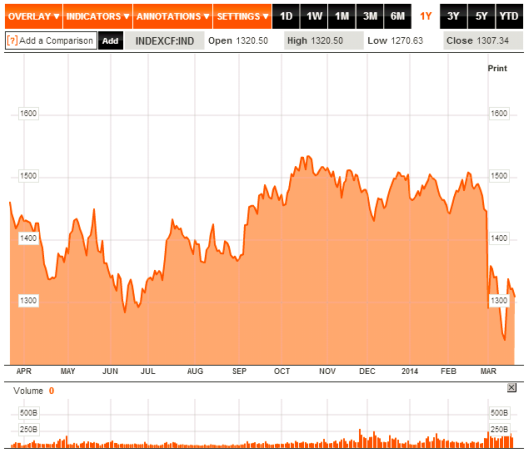
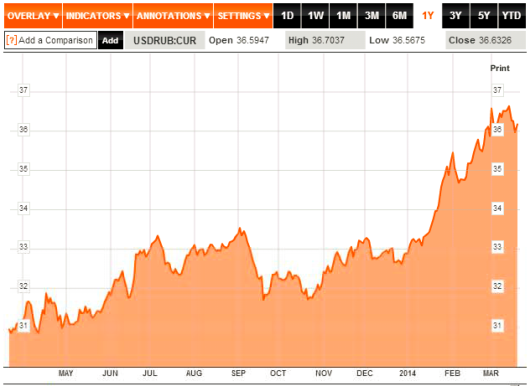
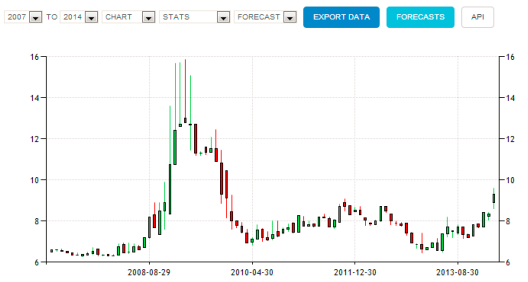
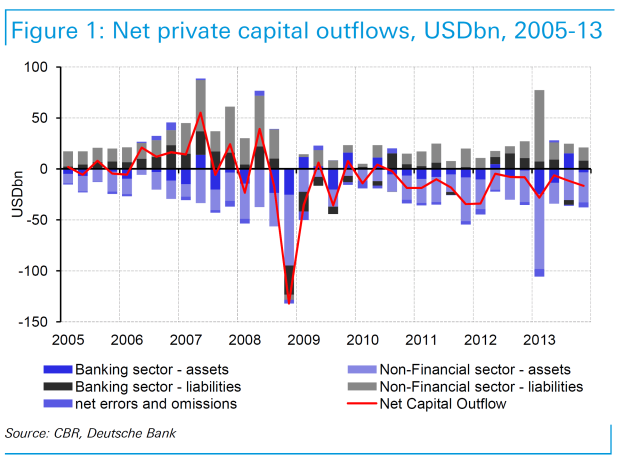
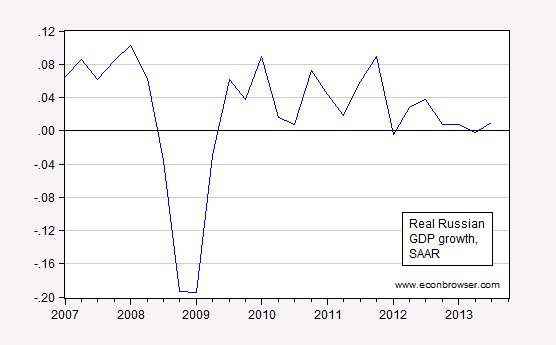
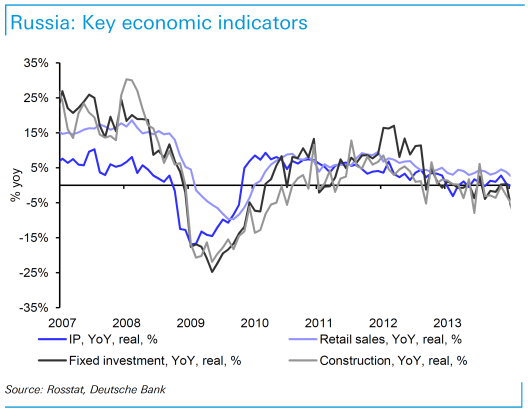
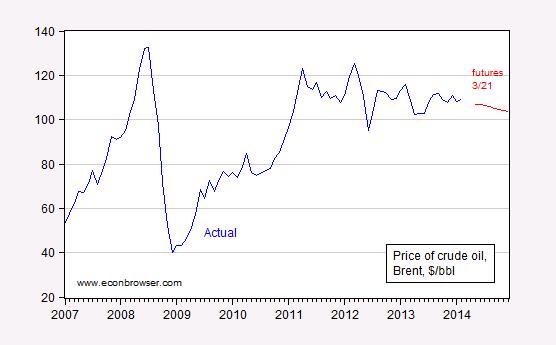
captcha not working
I’d be curious to see a companion to chart 4, which showed absolute level of GDP. Has Russia’s economy caught back up to where it was before the Great Recession? If so, it looks mighty marginal. Seems like Russians have been living with almost no growth for about 5 years: I’d think a 5% recession would be a big deal. Of course, I haven’t lived through Russian history – Russians seem willing to put up with almost anything.
I do not expect sanctions to be very effective because corporate interests trump foreign policy. For example, Exxon has invested $10 billion in Siberia and will scream bloody murder if Russia seizes their assets in retaliation. Recall that throughout the 90s Dick Cheney as head of Halliburton evaded sanctions on Iran. Back in 1996, Cheney blasted the Clinton administration for being “sanction-happy as a government.”
Question: You opposed unilateral sanctions on Iran when you were CEO of Halliburton.
Cheney: I did. That’s a whole set of considerations that a CEO doesn’t have to worry about, that a private company doesn’t have to worry about.
Corporations have no morals.
So Russia just bought the Crimea. Earlier they bought a large plot of land in north Georgia. They may pay a little more for Crimea but probably not much. Combined with almost no cost for their Georgia land it actually looks like a pretty good deal. And it is especially good considering the potential income from the Crimea. This cost of sanctions is not a very high price to pay for control of the oil pipelines feeding Europe, and the Europeans have already signaled that they don’t intend to ask Russia to pay much. Rubles still flow through London.
Captcha system is failing intermittently. I’m posting here to iterate the captcha numbering system so I can comment on the student loan post.
So many questions; so few answers. Immediate economic issues aside, the geopolitical issues loom very large. Will the Ukraine be offered a place in NATO and will that expose a paper tiger when Russia starts more “military exercises”? What will happen when austerity is imposed on the Ukraine after EU agreements and IMF loan provisions are set and the population realizes that they are worse off? What happens in November when Russia starts toying with natural gas feeds to EU and fuel prices skyrocket in the EU? What happens when Russia offers direct military assistance and technology to Iran and Syria?
Obama et al have opened a Pandora’s Box. Perhaps it is time to cancel the new red line and have some quiet diplomacy. Too much 歌舞伎.
Mr. Putin does not understand the Western diplomacy. The more sanctions the better.
Crimea was the most corrupt, backward and anti-western part of Ukraine. After the Ukraineans have a chance to let reality sink in, I wonder if they might come to the conclusion that they’re better off without Crimea. Some of us might feel the same way if Mexico took back Texas. Hey, I’d throw in Mississippi and Alabama just to sweeten the deal! And by the same token, Putin may find that he’s paid a pretty high price for privileges that Russia could have had at much less cost. Crimea has mostly symbolic value. The naval base is important for control of the Black Sea, but the Black Sea hasn’t been important since Jason and the Argonauts searched for some golden fleece. And the Crimeans are certainly looking for a lot of welfare support coming from Moscow. I don’t think anyone expects Crimea’s important tourism and natural gas industries to be thriving anytime soon. I agree with Bruce Hall that Russia’s military is largely a paper tiger. It’s big…~850K, but it’s also stretched. And the Ukrainean army is pretty big as well…~200K.
I wonder what those bankers in Cyprus are thinking right now.
2slug: don’t know why you went on an irrational rant about southern states, but not everyone sees Texas as a drag on the U.S. economy.
http://www.forbes.com/sites/larrybell/2013/08/27/texas-doesnt-need-to-secede-tis-better-for-the-union-to-join-texas-and-succeed/
Mr Hall, we must forgive are dear liberal friends, as so many
of them are inflicted with Bathos Syndrome, which perversely
effects rational reasoning.
The Zombie explains the plight of the left:
http://pjmedia.com/zombie/2014/03/10/progressive-racism-the-hidden-motive-driving-modern-politics/
It becomes easier to understand people saying unrealistic things, when one sees that there exist websites like this – so full of misinformation and demonization.
hans you have just lost all credibility with links to such filth. you really should be ashamed.
If you read that article carefully, it’s pretty clear that Texas is doing well almost entirely out of chance: 1) it has a lot of oil & gas, and 2) government in the US (as well as the rest of the world) is too weak to resist the oil, gas and coal special interests that ignore the enormous external costs of fossil fuels.
The Ukraine is an artificial country in many ways, clumped together by Joseph Stalin after WWII. The West of the country represented by the Galicia (not the Spanish one) are the descendants of the serfs who had been under the Polish or some other rule for a 1,000 of years. These serfs were originally Orthodox, but severe persecution by the Polish Catholics led to signing of a union of 1595 in which the Ruthenian Church broke from the Orthodox world and joined the Catholics. Note here that the church was called Ruthenian, that is at that time the Ukrainian identity was not in existence. The Polish also persecuted Ruthenian culture, law and identity.
The East of Ukraine represented perhaps by Poltava, where the battle between the Swedish king Charles XII and the Russian forces fortified with Cossacks took place in 1709, is part of the Steppes, a vast formally no-man’s land that stretches from the East of Ukraine to as far as China. This frontier land attracted many serf escapees and other freedom-seeking people. Eventually these people coalesced into armed self-defense units known as Cossacks. All along the steppes are many flavors of Cossacks, starting with the Ukrainian. The Ukrainian Cossacks time and time again chose the Russian side, starting with the Treaty of Pereyaslav in 1630 and then again in the battle near Poltava. This was perhaps because these people and Russians were Orthodox, while the Russian opponents were Catholics or Muslim. Ukrainian Cossaks did an outstanding job protecting themselves and Russia from the Muslim Turks and Catholic Polish.
The present Ukrainian regime is rooted partly in Galicia and may just simply be unacceptable to the Cossack East. The East fears a coercive spread of Catholicism and an attempt by the poorer West to take away their wealth. The East is numerically dominating, so the expectation is that come the May presidential elections, an Eastern president will be elected again.
Second, the present regime is an uneasy coalition of the “pro-Western” Tymoshenko oligarchs and West Ukrainian poor but militarily-organized nationalists. The first act of the regime was to free Tymoshenko. Criminal investigations were also opened against anyone remotely associated with her trial and conviction: judges, lawyers, witnesses, experts. Tymoshenko’s people occupy the most visible positions and are busy visiting EU signing treaties. The “legitimacy” of this group comes from their support by the Western countries and their claim to being able to deliver American and European $$$, guns and gas. Ukrainian print and visual media are full of pronouncements that the West and in particular the US will give Ukraine this or that, make Russia pay and return Crimea. Tymoshenko’s rhetoric is inflaming to say the least: http://www.tymoshenko.ua/en/article/yulia_tymoshenko_19_03_2014_01 . And if Western help is not forthcoming, it is because Ukrainians don’t suffer enough at the hands of Russians or the Westerners don’t understand how evil Putin and Russians are, escalate and escalate more. If anyone noticed, the Ukrainian side claimed an imminent attack from Russia for more than a month now, followed by Russian denials. Like today:
see drudge: http://www.drudgereport.com/ vs RT http://rt.com/news/russia-troops-limit-border-673/
The Hill reported that Tymoshenko’s husband paid directly to Wiley Rein short of a seven figure for services for 1-2 years. An unknown amount of money was funneled to the same firm via other Tymoshenko controlled entities: http://thehill.com/business-a-lobbying/business-a-lobbying/199114-lobbyists-for-jailed-ukraine-leader-courted-the
Do Tymoshenko and her group want democratic free-market reforms? I don’t know. This is my reasoning: Tymoshenko has not made her millions under free market. Her wealth comes from her farther-in-law’s and husband’s less-than-transparent gas deals with the same very country that she now vilifies. It is just as likely that Ukraine turns out to be a Rusophobic hysteria-gripped state fully dependent on the Western continuous aid for economic and military survival run by a clique of corrupt oligarchs.
The nationalists are the muscle that did the Maidan uprising and now controls security. The nationalists are not necessarily pro-EU ( http://www.kyivpost.com/content/ukraine/yarosh-right-sector-calls-for-ukraines-non-aligned-status-opposes-eu-membership-339957.html) and not necessarily see a difference between Tymoshenko and Yanukovich. But they will collaborate even with the devil if this advances the cause of Ukrainian nationalism. The ideological/spiritual leader of the nationalists is Stepan Bandera. Bandera was a NAZI collaborator active in organizing West Ukrainians into military units to participate in WWII on the side of German fascists. He is held in very high esteem in the West Ukraine precisely because he was willing to do anything to secure Ukraine for Ukrainians. His apologists also claim that Nazism and Communism were equivalently evil, it did not matter which side he picked as long as it advanced the Ukrainian Race. But that argument has baked into it the assumption that Ukrainian Nazism is somehow different from its German version. The second act of the new regime was to strip the Russian language off its official status. That law was not signed by a Tymoshenko’s group appointed head of the legislature. But no one seriously believes that the nationalists abandoned their goal of Ukraine for Ukrainians. The nationalists push for lustration and for a ban on the top 100-wealthiest oligarchs from serving in the government. The nationalist want Ukraine to go nuclear. Tymoshenko’s group periodically calls for disbanding nationalist militarized units, but can do nothing about it. The former Social National Party that rebranded itself as Svoboda Party is the junior partner in the essentially Tymoshenko government. An even more radical group called the Right Sector reorganized itself in a party and will run it the presidential elections. The Right Sector did the Maidan uprising.
Some nationalist armed units partake in attacks on “pro-Russian” journalists, officials from the previous administration and “pro-Russian” business interests.
A look through social media suggests that the Maidan “revolutionary” youth is high on nationalism and German paganism and heavy metal music:
A social media page for Social National Assembly that uses the same symbolism as the old Social National Party: https://vk.com/sna_golovna
Here’s a social page of a nationalist unit the Misanthropic Division: http://vk.com/w8tan and also http://vk.com/photo-44739306_325433665 (toten fur Woten — kill for Woten, a German pagan god). This unit became famous because it was attacked in Kharkiv by a local self-defense force: http://un.ua/eng/article/498477.html .
The nationalist program is untenable in the present shape Ukraine. The East of Ukraine is not ready to forget their dead at the hands of German fascists. Plus the nationalist program would require a massive ethnic-cleansing of some 30% of the population. If Ukraine breaks up, they could hold a majority in Galicia.
I doubt that many Ukrainians are going to forget about the famine visited on them by Stalin. Nor that they gave up their nuclear weapons in 1994 in exchange for signatures on a piece of paper from Bill Clinton and Boris Yeltsin. Which turned out to be worth less than the paper on which they were written.
Here’s an entertaining book on Ukraine’s recent history: The Red Prince;
http://www.amazon.com/The-Red-Prince-Habsburg-Archduke/dp/B0023RT0J0
‘Wilhelm Von Habsburg wore the uniform of the Austrian officer, the court regalia of a Habsburg archduke, the simple suit of a Parisian exile, the collar of the Order of the Golden Fleece, and, every so often, a dress. He could handle a saber, a pistol, a rudder, or a golf club; he handled women by necessity and men for pleasure. He spoke the Italian of his archduchess mother, the German of his archduke father, the English of his British royal friends, the Polish of the country his father wished to rule, and the Ukrainian of the land Wilhelm wished to rule himself. In this exhilarating narrative history, prize-winning historian Timothy D. Snyder offers an indelible portrait of an aristocrat whose life personifies the wrenching upheavals of the first half of the twentieth century, as the rule of empire gave way to the new politics of nationalism. Coming of age during the First World War, Wilhelm repudiated his family to fight alongside Ukrainian peasants in hopes that he would become their king. When this dream collapsed he became, by turns, an ally of German imperialists, a notorious French lover, an angry Austrian monarchist, a calm opponent of Hitler, and a British spy against Stalin. ‘
Stalin was an ethnic Georgian. Stalin also had Bandera executed in West Germany by an assassin, yet the Galician nationalists invited Georgian Mikhail Saakashvili to talk at a gathering. Lenin started NEP, new economic policy, which benefited greatly small farmers, the very small farmers that Stalin eradicated in the famine. Lenin was an ethnic Russian, so must Ukraine embrace Russia and demand recourse from Georgia?
Here’s a map of human life lost during the famine:
http://filipspagnoli.files.wordpress.com/2010/10/rate-of-population-decline-during-the-holodomor-famine-map.jpg
The East Ukraine represents about half of the region severely affected by the famine. The important agricultural Cossack areas of Russia suffered just as much. Galicia is not really even on the map. That’s because at the time they were under Poland.
In 1943-44, 4-5 years after German annexation of Poland, the Galician nationalists killed 70,000-100,000 ethnic polish in a massive ethnic cleansing in what is now West Ukraine: http://en.wikipedia.org/wiki/Massacres_of_Poles_in_Volhynia_and_Eastern_Galicia . In 1931, Ruthenians (West Ukrainians) comprised 11% of the population in Lwow, and Polish >64%. Now the Polish represent <1%, with the population still decreasing even after Ukrainian independence. Ideological descendants of those perpetrators are now part of the new Ukrainian regime. I am sorry I am being unconvinced that the Galician nationalists really care about the East victims, when they talk about the famine.